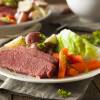Every year Passover comes around to remind Jewish people that “once we were slaves in Egypt and now we are free.” Sounds easy enough, right? Invite your friends and family over for dinner, drink some wine and have a few laughs about building the pyramids. Not so, my friends. “Celebrating” Passover requires deep cleaning your house, throwing all your best snacks in the garbage, and eating matzo for a week. Then there’s the Seder, the ritual dinner commemorating the liberation of the Israelites from slavery. It’s a highly structured meal consisting of storytelling, hand washing and four cups of non-vintage Manischewitz. If you’ve never been to a Seder, it’s worth experiencing, but chose wisely. My parents once hosted a Seder that ran five hours and put my cousin in the hospital. Seriously.
At the center of every Seder is the Seder Plate, a round platter with divots holding six symbolic items to help guide the meal and tell the story of Passover. It’s a kind of food diorama that’s constantly telling you, “Things could always be worse, you know.” Since I’m not much for tradition, I thought it’d be fun to search the city for dishes loosely correlating to the items on the Seder Plate. I put together a delicious and decidedly not-kosher-for-Passover five-course meal that will probably get me kicked out of my synagogue. But hey, that’s the price of freedom.

Amuse-bouche: The Hardboiled Egg (beitzah) at Townsman, Boston
The roasted hardboiled egg is a symbol of the ritual sacrifices that marked holidays in ancient Israel. Since the destruction of the Second Temple, Jews no longer sacrifice livestock but the egg is there to remind us of a time before we bought our corned beef from the deli. I couldn’t think of a better egg dish to start our dinner than the devilled eggs ($8) from Townsman in downtown Boston. Whet your appetite with these delightfully deconstructed tidbits; two soft boiled eggs are halved and smothered in a tart lemon aioli and harissa spice. The dish is topped with crispy fried hen skins and capers giving it a rich, salty finish.
120 Kingston St., Boston, 617-993-0750, townsmanboston.com

Salad Course - The Vegetable (karpas): The Pea Shoot Salad at Pennypackers, Somerville
This piece of the Seder Plate calls for a springtime non-bitter vegetable. Most families opt for a leafy green or root vegetable, which is then dipped into a bowl of salt water signifying the tears of Jewish slaves. I wouldn’t dare dip any of the vegetables in our second dish into salt water, but since the pea shoot salad ($4/$7) from Pennypackers in Magoun Square nearly brought me to tears, I think my rabbi will be cool. This salad is all things spring with peas, arugula, radish, spring onion and mint. Finishing the plate is shaved pecorino and a shallot vinaigrette.
514 Medford St., Somerville, 857-523-8948, pennypackersfinefoods.com

Appetizer – The Paschal Lamb (z’roa): Lamb Kofte Sliders at Sarma, Somerville
The only meat on the Seder Plate is the paschal lamb. (In my parent’s vegetarian house we had a “paschal yam.”) While the egg represented the generic holiday sacrifice, the lamb denotes the ritual sacrifice specific to Passover. Confused? Well, things can get a little convoluted when you have 3,000 years of beautiful tradition from Moses to Sandy Kofax, but just sit back and enjoy this next dish, the lamb kofte sliders ($11) from Sarma in Winter Hill. One of my favorite plates in the city, these perfect grilled bites are finished with a spicy tomato sauce, yogurt, brown butter and sumac onions.
249 Pearl St., Somerville, 617-764-4464, sarmarestaurant.com

Main Course – The Bitter Herbs (maror/chazeret): the Bone Marrow Pizza at Coppa, Boston
The Seder Plate has two bitter herbs, most often represented by horseradish and romaine lettuce, niether of which are bitter, nor an herb (discuss amongst yourselves). The bitter herbs signify the pain and (wait for it) bitterness of slavery. But there’s no feeling bitter about our main course of bone marrow pizza ($16) with roasted beef hearts and fresh shaved horseradish. This little bit of genius comes from Coppa in the South End and is every bit as good as it sounds. The philosopher Hillel (the “if not now, when?” guy) didn’t just invent great bumper stickers but may have also created humanity’s first sandwich. He was known for eating bitter herbs and paschal lamb between two pieces of matzo. In his honor, the chef recommends that you eat your pizza New York style.
253 Shawmut Ave., Boston, 617-391-0902, coppaboston.com

Dessert – The Sweet Mixture (charoset): The Apple Pie at Zoe's, Cambridge
The sweet mixture, which symbolizes the mortar used by the Hebrews when they were slaves, is commonly made by combining chopped apples, nuts, cinnamon and sweet red wine. Since nothing says freedom like America, we complete our meal with an essential piece of Americana, a warm slice of apple pie and vanilla ice cream ($4.50, because freedom isn’t free) from Zoe’s in Harvard Square. The pie here is just the right amount of sweet with a doughy, Greek-style egg crust that’s thicker and more savory than the traditional flakey butter crust and will make you forget about all that talk of bitterness, tears and affliction.
So there it is. I hope you’ve enjoyed this five course meal held together by a shaky premise. Now if you’ll excuse me, I have to look for a new synagogue.
1105 Massachusetts Ave., Cambridge, 617-495-0055, zoescambridge.com




